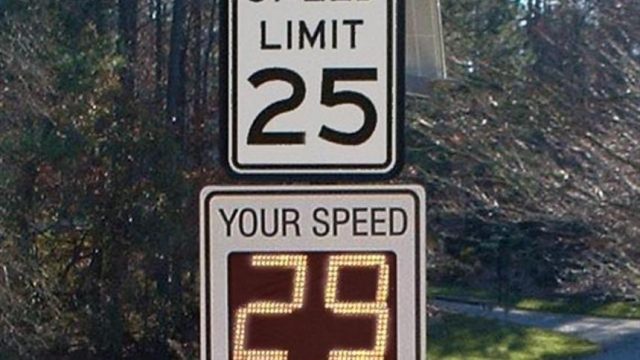Any Reform to North Dakota Speeding Fines Should Avoid Move Toward Policing for Profit

If there were no risk of death, injury, or property damage on our roads we’d have no need for speeding fines.
Unfortunately, that risk exists, and so to mitigate it we set speed limits and enforce them primarily with fines.
Many, including the editorial board of the Grand Forks Herald today, argue that North Dakota’s speeding fines are too low and should be raised for the sake of public safety. The Herald is touting a proposal for the upcoming legislative session from Grand Forks Police Chief Mark Nelson and City Councilman Danny Weigel (who is also a UND campus cop) to raise fines.
I reached out to Weigel to get some specifics, and he revealed that the proposal wouldn’t just make speeding penalties more severe. He’s also proposing a change to the way revenues are handled.
Here’s what he told me, via email:
I have offered two different trains of thought on my proposal and I will outline them here.
1. I would ask that the legislature change the law and add a $30.00 fee to all noncriminal moving violations. This would not include equipment violations such as headlights being out or taillights being out. For example if you received a $10.00 speeding ticket for doing 10 miles an hour over the speed limit in the City of Grand Forks that fine would now be $40.00 because of the $30.00 fee. I would ask that the revenue from the $30.00 fee be split up and go into two categories of funds. The first category would be road infrastructure and the second would be the SIRN (Statewide Interoperability Radio Network) project. These fees could only be used in these two categories. I would then ask that if the citation is issued into a municipal court that the fee stays in that municipality. I would ask that if the fine is issued in district court then the fee would go to the state. There would then be the opportunity to provide the money back to the county if the citation was issued by a Deputy Sheriff in a particular county. If citations were issued by the North Dakota Highway Patrol then the money would be the states.
2. Option number two would that the state legislature change the current law that allows our local governments to have local control over the issue of fines and fees in relation to noncriminal moving traffic violations. Currently as the law is written local governments cannot impose higher traffic fines then the state has. This decision was made by the North Dakota Supreme Court based on the way that the current law is written and on the books. This option would allow local governments to deal with the issue as they see fit with input from local constituents. While Grand Forks might have an issue with speeding Bismarck might have an issue with people disregarding stop signs. This would allow the local governments to decide how they feel they could best deal with the situation.
This sure makes it seem like revenue is as much an impetus for reform as traffic safety is. His proposals would open the door to local governments increasing revenues by writing more tickets.
We should not fund law enforcement based on the fines cops levy. Cops should have no skin in the game when it comes to fines.
This could also create a great deal of confusion. If, say, the City of Fargo can fine more for speeding than the State of North Dakota does, your fine for speeding in Fargo city limits could depend on whether you got pulled over by a Fargo police officer or a Cass County deputy or a highway patrolman.
[mks_pullquote align=”right” width=”300″ size=”24″ bg_color=”#ffffff” txt_color=”#000000″]If the issue is only that traffic fines are so low they aren’t sufficiently promoting traffic safety, then why not simply lobby the legislature to raise the fines uniformly across the state?[/mks_pullquote]
That shouldn’t be.
If the issue is only that traffic fines are so low they aren’t sufficiently promoting traffic safety, then why not simply lobby the legislature to raise the fines uniformly across the state?
The answer is that the issue isn’t traffic safety. Or, at least, it isn’t just traffic safety. The issue is local governments, and local law enforcement agencies, wanting more revenue from writing tickets.
But are our speeding fines really too low?
It’s hard to do state-to-state comparisons when it comes to speeding fines. The way the laws are constituted and enforced varies a great deal across the nation. Still, as Autoevolution notes, North Dakota has some of the most lax speeding laws in the nation. “In North Dakota, the police fines drivers $10 for going ten mph over the limit, which is extremely lenient when compared to New Jersey,” the article reports. “The state also has the lowest speed trap activity, and the lowest fines for state roads that have limits below 55 mph.”
North Dakota also consistently ranks as having some of the worst drivers in the nation, but is speeding the problem? If you look carefully at these statistics, the problem seems to have less to do with speeding than impaired driving.
I’m not against raising speeding fines, though I’d like to see more data to demonstrating that we can improve traffic safety with higher fines.
What we should all be against is creating an incentive for law enforcement agencies to write tickets for reasons other than traffic safety.




